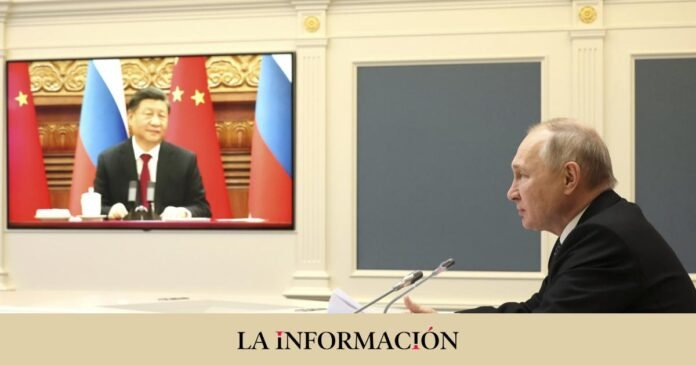Russia, with Gazprom as its implementing arm, has become one of China’s major oil and gas suppliers for good. The Kremlin has sent the Asian giant 13.8 billion cubic meters of gas (bcm) in the last year through the Power of Siberia gas pipeline that is underway. This makes it its second supplier per tube and its fourth largest supplier of liquefied natural gas (LNG). Industry sources say that the increase in gas that Gazprom sends to the East is practically equivalent to the cut that it plans to send to Europe.
Russian President Vladimir Putin himself has assured that natural gas shipments to the Asian country have exceeded daily contractual obligations by 18% in December. It should be noted that the Power of Siberia, which can send gas to Shanghai along 3,000 kilometers, is in its final stage of construction, although it is already going to leave fuel in various parts of northern China. Specifically, on December 7, a historical maximum for gas supplied through the pipeline was reached.
The energy relationship between the two countries has intensified since Russia invaded Ukraine on February 24 last year. However, in 2014 they already signed a mega-contract for three decades valued at 400,000 million dollars (about 350,000 million euros) through which the Russian giant supplied 38,000 million cubic meters of gas to the eastern country per year. In this way, a market was opened to Russia at a time when the demand for gas fell in Europe and in which Brussels began to sanction it for the annexation of Crimea. On its side, Beijing achieved greater independence from coal consumption and bought Russian gas at a more advantageous price given the impossibility of the Kremlin to place it in other markets.
Russia and China also sealed an “unlimited” collaboration pact last year. The agreement with the Asian giant shielded it precisely in the energy, technology and logistics sectors, which in the long run could largely cancel out the effect of Western sanctions.
new connections
On the other hand, Gazprom, controlled by the Russian State, has signed a contract for the design of the Power of Siberia 2. This gas pipeline will be key for the country because it will supply China with 50,000 bcm per year that passes through Mongolia. Russia thus seeks to diversify and export more to its allies, while China is in need of energy.
After the invasion, the European Union (EU) and Russia agreed on one point: not to depend on each other energetically speaking. The International Energy Agency (IEA) itself proposed a series of measures to the EU so that it could reduce imports of Russian gas “by more than a third” or 50,000 bcm in just one year. According to IEA data, in 2021, the EU imported an average of 380 bcm of gas per day via pipeline from Russia, which is equivalent to around 140,000 bcm for the year as a whole.
In addition, some 15,000 bcm are supplied in the form of LNG. In total, last year the EU bought 155,000 million cubic meters of natural gas from Russia, which represents around 45% of total imports and close to 40% of its total consumption of this fuel. To punish Russia, Germany paralyzed the approval process for the Nord Stream 2 gas pipeline, a strategic infrastructure to transfer natural gas to the Old Continent. The gas pipeline, which connects Russian reserves with the western part of Europe through the Baltic Sea, is already complete, but its operation was pending certificates of operation in the German country.
Russian supply cut
After being buried as a result of the invasion, Gazprom completely cut off supplies to Germany via the Nord Stream 1 Europe. Russia thus loses Europe, its main market for its exports and its largest source of foreign investment. On the other hand, since the beginning of December the import of crude oil by sea has been prohibited in the EU.
The EU has also recently applied a cap of €180 per megawatt hour (MWh) on the price of gas imports. Specifically, ‘cap’ will be activated when the gas price in the Dutch TTF, a reference in Europe, exceeds 180 euros/MWh for three consecutive days and, in addition, there is a price difference of 35 euros compared to the international markets. They established this mechanism due to the refusal of some northern countries to apply a limit that will only affect Russian gas due to possible retaliation.

